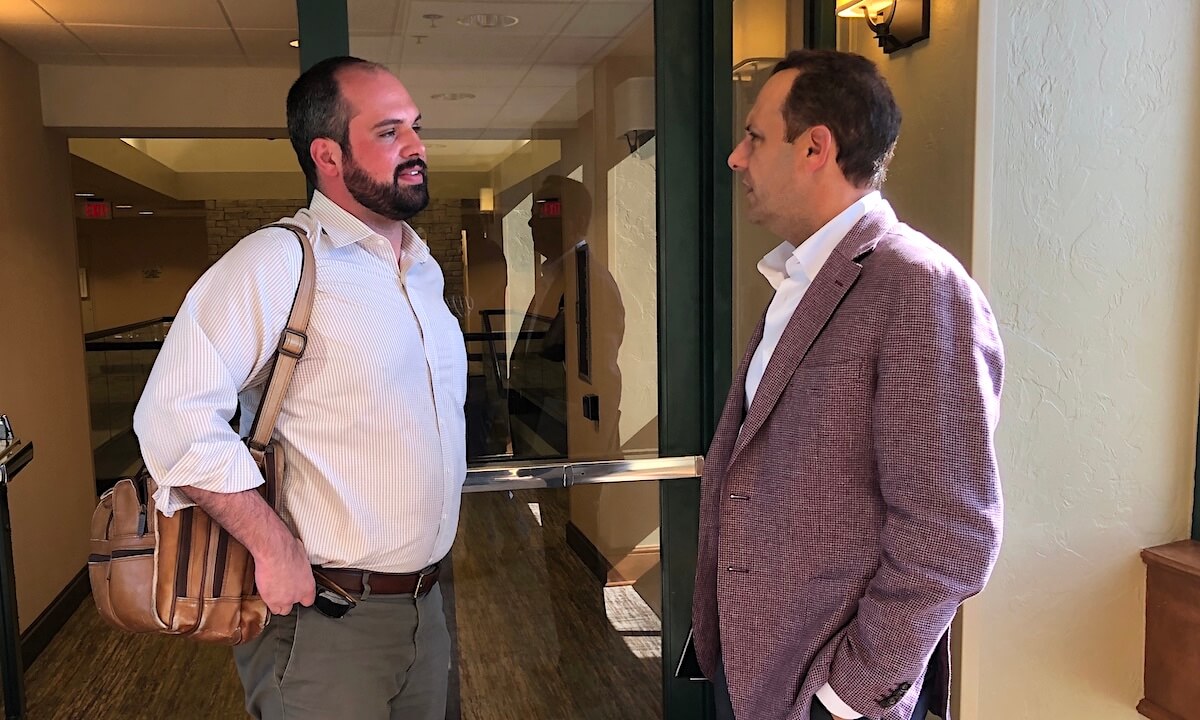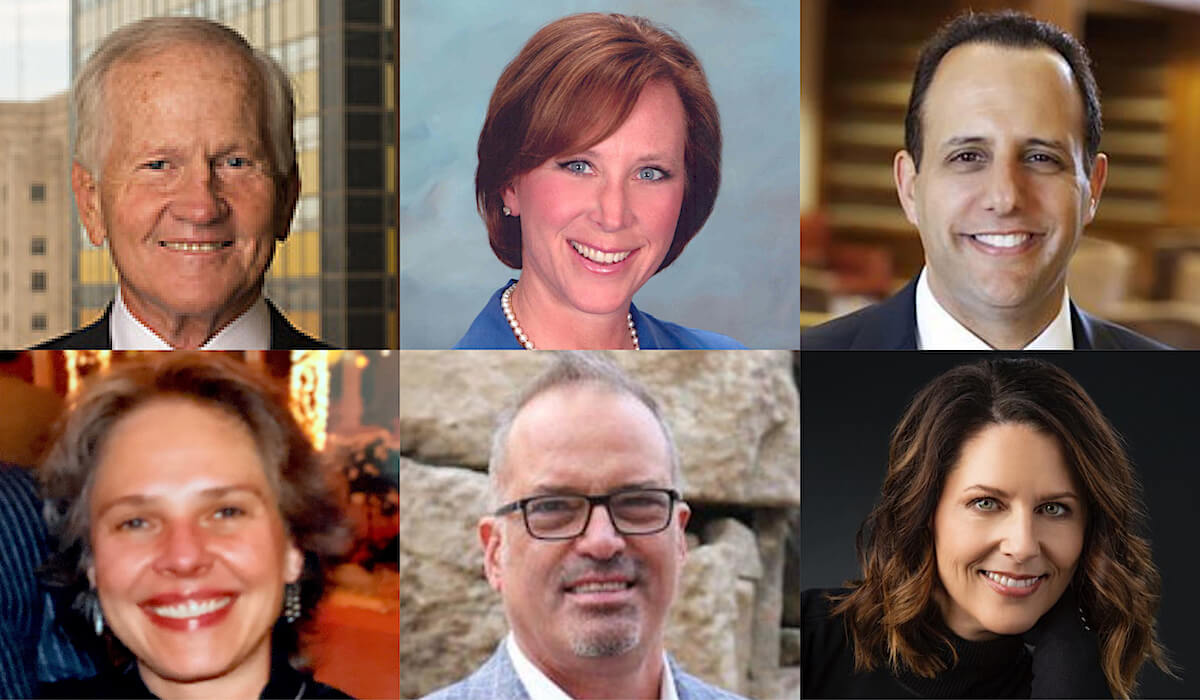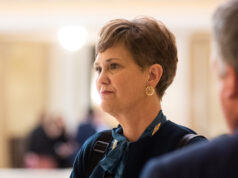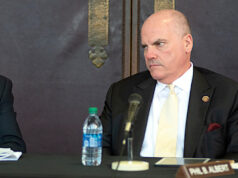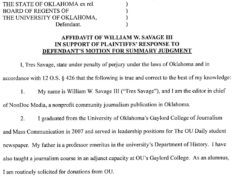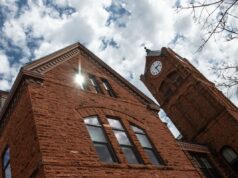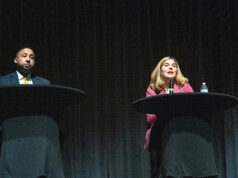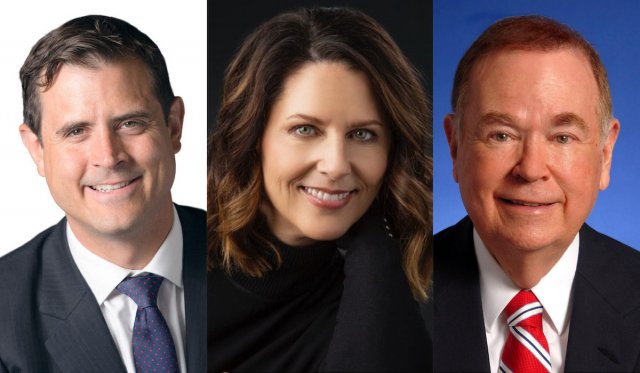
Rarely do private conversations among influence brokers become public, but two recordings distributed to media by University of Oklahoma professor Suzette Grillot divulge candid comments that highlight what had become a strained relationship between now-former President David Boren and OU’s Board of Regents, the seven-member body charged with overseeing university governance.
First reported by Bailey Lewis of The OU Daily, Grillot’s Feb. 19, 2018, conversation with Boren and her Feb. 21, 2018, conversation with OU Regent Renzi Stone revolve around the impending end of Boren’s 24-year presidential tenure, which ultimately became the subject of internal and criminal investigations of alleged sexual misconduct and alleged financial impropriety.
Boren has denied wrongdoing, but in June he agreed to resign his remaining professorial position at OU and end all association with the university, an action accepted and announced by the OU Board of Regents.
Grillot is suing the university and Boren’s successor, former President Jim Gallogly, after he removed her as dean of the David L. Boren College of International Studies. On Sunday, Grillot said she made and ultimately released her recordings to shine light on an institution she values.
“I’ve had a 20-year experience at OU of deep, engrained corruption that I could not stomach any longer, and I could try to do something about it,” Grillot said. “If you can do something to try to fix a problem, you should.”
Key comments in the recordings
Whether Grillot’s recordings show “corruption” is a matter of opinion, but the conversations reveal details about Boren’s relationship with at least one member of an OU Board of Regents that he often held enormous sway over during his transformative tenure.
Made in February 2018 — about four months before Boren was scheduled to step down as OU’s top executive — the recordings include several notable exchanges:
- Recalling how Grillot co-chaired a search committee that ultimately named Kyle Harper as OU provost in May 2015, Boren mentions the influence he had over Harper’s selection. “If I had probably not sort of tried to push that so hard, it probably would not have happened,” Boren says before adding that he hopes the presidential search committee would not choose Harper as his successor.
- In his conversation with Grillot, Stone mentions that he was also on the provost search committee. “You know what I was instructed? ‘We are looking for somebody who looks a lot like Kyle Harper.’ That’s what was instructed to me.” Stone says he explicitly does not want the presidential search committee to be “something like that.”
- Stone says faculty frustration about administrative transparency stemmed from Boren’s style. “It’s reflective of his leadership. And if I could tell you anything, you have six regents — you used to have seven — who are the reason that he is not staying.”
- Boren tells Grillot that if anything needs to be done for the college that now bears his name, they should act quickly because “I can only slip so many things past as I’m going out the door.” Boren makes multiple estimations of his ability to “slip” things “past” the regents.
- Grillot tells Stone that Boren “is a wonderful leader and a wonderful man who has done many things that are great,” but she emphasizes that she and other faculty feel “a significant amount of cynicism for how this administration has worked for years.”
Both of Grillot’s recordings are embedded at the bottom of this piece in full, except for six-and-a-half minutes at the end of her conversation with Boren where the pair discuss a faculty member’s personal health challenge. NonDoc edited the recording to exclude that discussion.
Stone: ‘The change you’re seeking is already under way’
The chairman and CEO of the public relations firm Saxum, Stone issued a statement over the weekend about his call to Grillot:
This conversation was secretly recorded a year and a half ago by a vocal critic who is currently suing OU. I encourage everyone to listen to the entirety of my conversation in the recording. As a regent, I have learned and become better informed by having conversations with faculty, staff and students as we have navigated this time of great, positive change. I’m proud of interim President (Joe) Harroz’s work, especially on diversity, equity and inclusion of which I’ve been involved. We all recognize more needs to be done.
Lauren Brookey, OU’s vice president of marketing and communications, said the university had no comment on Grillot’s recordings beyond Stone’s statement.
In the 55-minute recording with Stone, the former OU basketball player says he called Grillot to discuss her publicized concerns over the presidential search process that would ultimately select Gallogly.
“The change you’re seeking is already under way, so maybe we can be a part of it together and see if we can get to the end in a positive way,” Stone says. “I’m communicating to you as one regent. I didn’t tell anybody else I was calling you. I’m calling you on my own, and for us to work together on it, we have to be able to trust that we are trying to work on it.”
Grillot tells Stone that she believes finalists for the OU presidency should be known publicly and scrutinized by the larger university community. Stone says the regents discussed that idea but worried that such a high-profile selection process might prevent various people from applying.
“We don’t need or want wimpy leaders,” Grillot responds. “It’s an overall culture that needs to change.”
Stone emphasizes his agreement.
“You’re right, there is a lack of trust, and it’s sowed by David (Boren) and how he has governed for the last 23 years,” Stone says. “And you’re right about that. I know that.”
Stone criticizes the search process that selected Harper as provost, saying it was “like every other search that [Boren] has done, and our regents absolutely despise that.”
Grillot lets fly a litany of examples.
“That’s a fake search for provost, that’s a fake search for dean of business, that’s a fake search for dean of arts and sciences that is going on now, that’s a fake search for graduate dean,” Grillot says. “We’ve had nothing but fake searches here. That’s the legacy. You can go on down the ranks of where there haven’t even been searches, and I’ve been the beneficiary for that. He announced that there would be no search for my position after we got to know each other and I guess he was happy with my job. Then he just decided on his own. I was fully prepared to have had to compete for my job.”
Stone says he can assure Grillot that the regents are committed to changing OU’s internal culture.
“We recognize to a person that it is time to do it differently, and it is time to get fresh blood,” Stone says. “There are some great things that the man accomplished, but he stayed too long. So we recognize that, and we are aligned and on the same page on helping move him to the next phase of his life and getting a new person in and helping him not taint the new person when a new person comes in.”
Stone affirms Grillot’s concerns about past “fake searches.”
“What I just heard from you is reflective of how we feel, too. We know that it’s a disaster in a lot of ways. We know that there are all sorts of morale issues. We are aware of a lot of these things, I’m sure not to the extent that you are, and I’m not supposing we are,” Stone says. “But if you and I can keep an open dialogue, it’s real easy to look at the regents as six rich guys and girls that the governor appointed because of some political favoritism who may have their own interests in who they hire, and maybe they’re just going to hire whoever David wants them to hire. And that is not what we are doing.”
RELATED
Joe Harroz spoke to Jones Day, confirms Title IX review by Tres Savage
Ultimately, Grillot remained displeased with the selection process that resulted in Gallogly’s brief and reform-heavy presidential tenure, clashing with the former oil executive and infamously calling for his resignation at a student rally.
Grillot is not alone in her criticism of Gallogly, either. Boren’s attorney, Clark Brewster, reiterated his belief Sunday that Gallogly orchestrated an attack on Boren’s character after assuming office. Brewster also criticized Grillot for “muckraking.”
“Here is a person that is making a call based upon the idea that she has a trust, a friendship, a confidence and a relationship that is born out of candid discussion, and she’s taping it. Then she goes to the other person and tries to create some kind of strife or reaction,” Brewster said. “That to me is not only so wrong from an honest and ethical standpoint, but it really is pathetic. I hate to use the word. It’s overused many times, but in this instance it is apropos.”
Boren: ‘I can only slip so many things past as I’m going out the door’
While Grillot’s recording of Stone opens with talk of OU’s education abroad program and property in Arezzo, Italy, she discusses another focus of the College of International Studies in depth with Boren.
In their February 2018 phone call, Boren asks the then-dean whether she was conducting an official search for another faculty position in the Farzaneh Family Center for Iranian and Persian Gulf Studies, which has largely been funded by private donations from Jalal and Mohammad Farzaneh, Iranian natives who are community philanthropists and co-founders of Home Creations.
Grillot tells Boren she had submitted a request to hire another Iranian studies professor but that it was not approved.
“We just don’t have the enrollment to support it anyway,” she says. “We’ve got three faculty members that aren’t even teaching full classes as it is.”
Boren replies, “Oh really?”
“Oh yeah. We grew fast, which is great, but, you know, we’ve grown fast enough to where we don’t have enough students yet,” Grillot says. “We haven’t built it to get enough students in the classes to, I think, justify the additional hires.”
She and Boren discuss how the Farzanehs have funded up to two additional positions in their donor agreement, and Grillot says the U.S.-Iranian relations position is “the really important” faculty opportunity. Boren agrees.
“When I talked to them, they wanted to think of new institutes and all sorts of things,” Boren says. “I said, ‘I’m just going out the door, so I don’t think that’s doable.’ But I said I think I could get one more faculty slot into the budget this year and get it past the regents because it’s part of the agreement with them.”
Boren doubles down on saying he could get something “past” the OU Board of Regents.
“I can only slip so many things past as I’m going out the door. But I think I could maybe slip one more past,” he said. “But do you think we would even have the students then to take the courses?”
Grillot says she was of “two minds” in answering that question.
“One is that we really don’t need another professor because we just don’t have enough students taking the courses,” she said. “One of our Iranian studies faculty members has no students this semester.”
As Grillot explains how the professor is co-teaching with another faculty member, Boren expresses surprise: “Oh good heavens.”
“But on the other hand, the one position I think could really help the program and actually draw more students to the program is the politics position,” Grillot continues. “Because right now we have language people, we have a sociologist and we have a historian that studies, like, ancient Iran. We don’t have anybody who does contemporary.”
Boren agrees, saying he believes U.S.-Iranian relations would be of interest to a broader student population.
“I don’t know the process on this, but I’d be prepared to let you open that search to let you try to get it done. Of course, I don’t know how fast that can happen,” Boren says. “I could try to put it in the budget this time or whatever. I think that would be the last opportunity I would have to try to — and of course they’re trying to get their agreement carried out while I’m here — which I understand.”
Grillot says the position of the Farzanehs makes sense.
“I completely understand it. I know that they are worried about what’s going to happen with their agreement in the future,” she says, noting that if an additional professor could be hired she hoped it would be someone with a leadership skillset.
Grillot: ‘So much potential there, and yet we struggled’
Asked Sunday about the situation she and Boren discussed in the recording, Grillot praised the Farzanehs as “extremely generous people” but said disagreements over the additional faculty position’s role ultimately stalled its creation, despite support from Gallogly and Provost Kyle Harper.
“There is so much potential there, and yet we struggled,” Grillot said Sunday, adding that such circumstances are common in higher education. “It is further evidence of how donors, administrators and faculty have such a hard time getting on the same page and working in concert to do really great things. (…) That example is replicated again and again and again, not only at the University of Oklahoma, but in higher ed. It is extremely challenging to work through all of that.”
Jalal Farzaneh said he was unavailable for comment over the weekend, but he has spoken in the past about his family’s commitment to educating future generations on the topics of Persian culture and history.
RELATED
David Boren situation features ethical complexities by Tres Savage
“It is very, very important for all of us to do what we can for future generations, especially in light of the current state budget situation,” Jalal Farzaneh said while announcing a $4 million gift in a 2016 OU press release. “It is the American way to help each other.”
But Grillot referred to Boren’s comments about slipping things past the OU Board of Regents as “scheming,” which she said underscores the institutional problems she wants to see corrected.
“It definitely demonstrates the toxicity at the very top of an institution of higher education and how at odds the regents and Boren were,” Grillot said Sunday. “All of that taken together really indicates how troubled this administration was and — I will maintain — is still. (…) That’s why people need to hear this. That is the attitude.”
Brewster, Boren’s attorney, said his client’s comments about the OU Board of Regents are reflective of a leader who “has the confidence of his board” to make improvements or corrections in an organization.
“He was just giving his open thoughts. From President Boren’s standpoint, I didn’t see any kind of dishonesty or improper remark in any regard,” Brewster said. “He was just himself, which is to be open and candid and friendly and giving. And I feel the same for the other side for Regent Stone.”
Grillot, who also released a podcast on the topic over the weekend, said she knows “haters” will criticize her decision to record and publicize the two conversations. But she said interim President Joe Harroz’s long tenure as a Boren staffer, legal counsel and protegé means the words of Stone and Boren remain noteworthy even 18 months later.
“The same people are still there. The same system is still there. The same corruption is still there,” she said. “It’s critical to take these conversations with Renzi and Boren and consider those constructive for where we still are and where we are headed in the future.”
The OU Board of Regents is scheduled to meet for lunch at 12:30 p.m. Tuesday and for a full meeting 9:30 a.m. Wednesday at the National Weather Center, 120 David L. Boren Boulevard in Norman.
Grillot’s lawsuit against OU — for which she is represented by Rand Eddy, father of Boren accuser Jess Eddy — is one of 11 suits listed on Wednesday’s agenda for potential discussion during a proposed executive session.
Suzette Grillot and David Boren phone call
Suzette Grillot and Renzi Stone phone call
(Editor’s note: Home Creations has purchased advertising on NonDoc in 2019 and previous years.)
(Correction: This story was updated at 11:30 a.m. Monday, Sept. 9, to correct a word transcribed from the audio of Renzi Stone and Suzette Grillot’s conversation. NonDoc regrets the error.)









